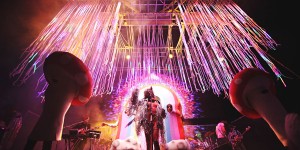World Goes Pop: South Africa
by Jeremy Mersereau
March 28, 2012
Welcome to World Goes Pop, a regular feature where we’ll be taking a closer look at pop’s global presence. Each time we’ll be focusing on one country’s pop music industry: its history, its stars, and its evolution. This week: South Africa.
Welcome to World Goes Pop, a regular feature where we’ll be taking a closer look at pop’s global presence. Each time we’ll be focusing on one country’s pop music industry: its history, its stars, and its evolution. This week: South Africa.
If you’re anything like me, you’ve often wondered to yourself “Man, is there a country out there somewhere whose global perception of their popular music is based entirely on one high-concept electro-prank-rap-dance group who found stardom on Youtube?” Well, wonder no more, fellow weirdos, because yes indeed there is! No, no, people, I’m not talking about Colombia’s Bomba Estereo, I’m of course talking about South Africa’s Die Antwoord!

Say what you will about the Antwoords, but you have to give it up for a crew that managed to capture the fickle attention of 2009 as effectively as “Enter the Ninja” did. Oh, 2009…we thought we’d seen it all. Until the Undercut Seen Round the World blew our collective mind. Through all the video editing and perfect-storm levels of irony, the big reason Die Antwoord exploded was that they put a high-res, cranked-up version of the culture that shaped them on display through their videos, image, and interviews. As entertaining as next level beats and ‘zef’ style are, Die Antwoord is a household name (well, depending on how many old Vice issues you have lying around your household) because of how skillfully they were able to pique the Internet-at-large’s curiosity about South Africa. Consider it piqued, you loveably exotic scamps!

South Africa’s capital, Johannesburg, is known for two things: getting invaded by bug aliens in that one movie (I think it was called…Bugazoids from District 7), and oh yeah, also for being fucking terrifying. Joburg’s development was spurred by the discovery of gold and gems in the 19th century, necessitating heaps of labor — a need filled by indigenous Africans. Don’t worry, I’m sure they were all fairly compensated and not discriminated against at all by the colonial powers of the time. Lemme just Google it to make sure. Oh. Yikes.
Groups like the Xhosa, Zulu, and Tswana all brought their own musical traditions to Joburg, and by the institution of apartheid in 1948, the city boasted a burgeoning music industry, with many key record labels forming around that time. The 1980s delivered notable Zulu choir Ladysmith Black Mambazo (still in my top 10 band names of all time, in just behind Hoobastank at #2), who were featured on Paul Simon’s Graceland in 1986. Talk about your dream team!
As the years went on and the ANC-led fight against apartheid progressed, the citizenship of superstars like Miriam Makeba was revoked and they were forced out of the country. When apartheid finally died due to the ANC political party and their charismatic leader –

South African musicians of all backgrounds were free to mingle and experiment with new forms and cross-pollinate genres like reggae and hip-hop with homegrown styles like kwaito and kwela. Today, South African music bears traces of DNA from across the globe, from Jamaica to Denmark to New York. So let’s take a look at what modern South African pop sounds like:
“Pump it On” by Toya Delazy definitely qualifies as a hit: it made its debut on Johannesburg Top 40 station 5FM during summer of 2011, and has maintained a stranglehold on the South African charts ever since. And more to the point, it’s a fucking jam. With only 62 thousand views and the fact that I had to look up Ms. Delazy on her Reverbnation page, it’s pretty safe to say very few have caught on in North America yet. If only we had our own superstar DJ/professional cultural tourist.
Here’s the appealingly-named Snotkop with the Afrikaans-language “Song Vir my Dad.” I don’t speak Afrikaans, so going by the title and the video, I’m assuming the song is about getting dumped by your best gal, or something. Just like the Biebs and the Ushers that we’re used to, Snotkop’s all about the ying yang: sometimes he’s blowin’ up the club, sometimes he’s getting mad wistful sitting alone in his attic watching old filmreels of his dad.
While we’re on the goofy Afrikaaner tip, check out frequent Die Antwoord collaborator and fellow rapper Jack Parow, with “Byellville.” Not to stereotype, but didn’t I see this exact dude fronting every dance-rock band ever? I wish some rapper here would take the giant-brimmed hat gimmick and run with it. Anyone? Lookin’ in your direction, Cam’ron.
“Fat thighs/flabby arms/A pot belly still gives good lovin’.” Hell yes. Sing it, sister! Having crafted the definitive anthem for perma-friendzoned MMORPG players everywhere, Freshlyground could have rested on their laurels. But no, this alt-universe gender-swapped Dave Matthews Band kept on their grind and have released 5 acclaimed albums since 2003.
So there you have it: a quick look at South African pop. We’ve seen the lows, the highs, the giant-brimmed hats, and that quintessential, everyday hero, Snotkop. May he see his dad again one day. See you next time.
Tags: Music, Featured, News, Die Antwoord, Jack Parow, Ladysmith Black Mambazo






